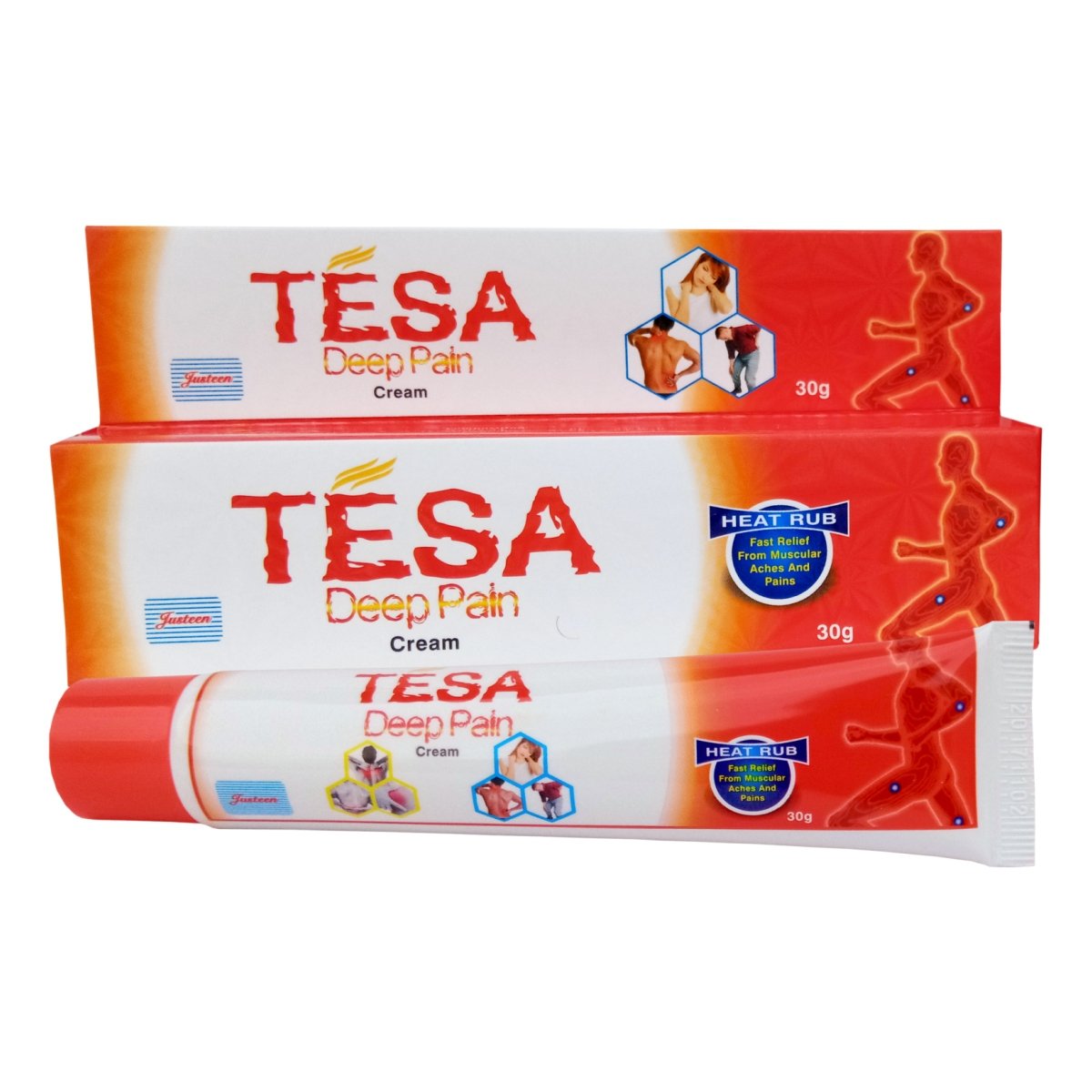
Tesa Cream
TESA
Deep Pain Cream
-
DOSAGE FORM & STRENGTH
Composition:
Mentholo: 4% w/w
Methyl Salicylate: 13% w/w
Clove Oil: 3% w/w
Purified Water: 8% w/w
Ointment Base: 72% w/w
-
HISTORY OF ACTIVE INGREDIENTS
Methyl Salicylate is a salicylic acid derivative and provides local irritant effect. Mentholo when applied to the skin dilates the blood vessel, causing a sensation of coldness followed by an analgesic effect.
It has also applied to the forehead, presumably as a counter irritant, for relief of headache. Clove oil has anti-inflammatory and analgesic effect when applied topically.
-
PHARMACODYNAMICS
Mentholo relieves itching, dilates the vessels causing a sensation of coldness followed by an analgesic effect. Methyl salicylate has the actions of the salicylates. It is readily absorbed through the skin and has counter-irritant properties. Clove oil has anti-inflammatory and analgesic effect when applied topically. -
PHARMACOKINETICS
The product exerts its action locally: little or no absorption is expected to occur. -
INDICATION AND USAGE
Aches and pains of joints and muscles associated with arthritis, backaches, fibrositis, lumbago and sciatica. -
CONTRA-INDCATION
- Not to be used on children under 5 years old. Do not apply to skin abrasions.
- Do not apply to irritated skin
- Hypersensitivity to the active substances or to any of the excipients
- Contraindicated where there is known hypersensitivity to aspirin, other salicylates, or other non-steroidal anti-inflammatory drugs (including when taken by mouth) especially where associated with a history of asthma
- If irritation develops, use of the product should be discontinued.
-
INTERACTIONS
There have been reports that topical salicylates may potentiate the anticoagulant effects of warfarin Menthol has also been reported to interact warfarin (when taken orally), decreasing its effectiveness. -
WARNINGS
Long-term continuous topical therapy should be avoided. Prolonged use may lead to skin sensitisation and the emergence of resistant organisms. If applied to the eyelids, care is needed to ensure that the preparation does not enter the eye, as glaucoma might result. -
PREGNANCY & LACTATION
Pregnancy:
Topical application may cause abnormalities of foetal development.Lactation:
Caution should be exercised when using topically. Keep all medicines out of the reach of children. -
PRECAUTIONS
- Not on broken skin.
- Avoid contact with the eyes and sensitive areas of the skin.
- Wash hands thoroughly after use.
- If symptoms persist consult your doctor.
- Not to be used on children under 5 years.
- Discontinue use if excessive irritation occurs.
-
ADVERSE REACTION
Use sparingly on tender skin and do not cover immediately after application. If an adverse reaction occurs discontinue use immediately. Known side effects of menthol- contact dermatitis or eczema, hypersensitivity reactions characterised by urticaria, flushing and headache. -
DRUG ABUSE AND DEPENDENCE
Not Applicable -
SYMPTOMS OF OVERDOSE AND ANTIDOTE
When used externally as directed, overdose is unlikely. However, symptoms of systemic salicylate poisoning have been reported after the application of salycylates to large areas of skin or for prolonged periods. Salicylism may also occur in the unlikely event of large quantities being ingested.
Antidote:
Activated charcoal may be administered if significant quantities have been ingested within an hour of presentation. The plasma salicylate concentration should be measured, although the severity of poisoning cannot be determined from this alone and the clinical and biochemical features must be taken into account.Elimination is increased by urinary alkalinisation, which is achieved by the administration of 1.26% of sodium bicarbonate. The urine pH should be monitored. Correct metabolic acidosis with intravenous 8.4% sodium bicarbonate (first check serum potassium).
Forced dieresis should not be used since it does not enhance salicylate excretion and may cause pulmonary oedema.
Haemodialysis is the treatment of choice for severe poisoning and should be considered in patients with plasma salicylate concentrations >700mg/L (5.1mmol/L), or lower concentrations associated with severe clinical or metabolic features. Patients under ten years or over 70 have increased risk of salicylate toxicity and may require dialysis at an earlier stage.
-
DOSAGEANDADMINISTRATION
Gently massage Deep Relief Cream into the affected area until the penetration of the cream is complete. Apply2-3 times daily. -
THE PREPARATION FOR USE
Not Applicable -
PRESENTATION
30gm tube packed in a unit carton along with Patient Information leaflet. -
STORAGE CONDITION
Store in a dry place at temperature not exceeding 30?C. Protect from light. Do not freeze -
ANY OTHER INFORMATION
For external use only. -
NAFDAC Reg. No.
A4-B375


